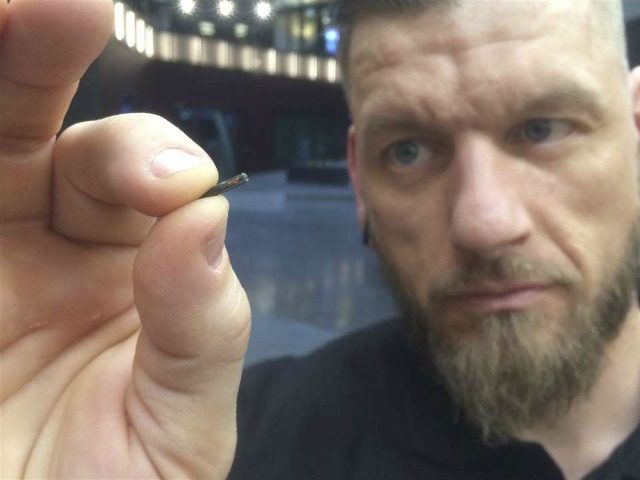Everyone will be implanted with a microchip in the future, according to a report from USA Today.
An associate professor of sociology at the University of Wisconsin-Milwaukee is arguing that most humans will receive a microchip implant in the future. “It will happen to everybody,” says Noelle Chesley, an associate professor of sociology at the University of Wisconsin-Milwaukee. “But not this year, and not in 2018. Maybe not my generation, but certainly that of my kids.”
Although some say the social stigma over inserting technology into one’s body will hinder Chesley’s prediction, a Wisconsin firm has already made the futuristic leap. The company, Three Square Market, implanted a microchip into their employees to do away with company badges and corporate logons.
“You’ve got to have a lot of trust to put one of those in your body,” Grayson says. Workers will need assurances the chip is healthy, can’t be hacked, and its information is private, he says.
“In 10 years, Facebook, Google, Apple and Tesla will not have their employees chipped,” he says. “You’ll see some extreme forward-looking tech people adopting it, but not large companies.”
But Three Square Market isn’t the only successful implementation of microchips. In Sweden, 3,000 transit rides have opted to have microchips implanted so that they can ride the national rail system without having to show a ticket when boarding.
“the time is now” for chips to be more commonly used, says Amal Graafstra, founder of Dangerous Things, a shop supplying “custom gadgetry for the discerning biohacker.” “We’re going to start to see chip implants get the same realm of acceptance as piercings and tattoos do now.”
“It becomes part of you the way a cellphone does,” Graafstra argues. “You can never forget it, and you can’t lose it. And you have the capability to communicate with machines in a way you couldn’t before.”
Despite the excitement about the potential of such technology, some state lawmakers are concerned about companies forcing their employees to comply with requirements to have the chips implanted. “That’s what we’re worried about,” says Bryan Allen, chief of staff for state Rep. Tina Davis (D), who introduced a bill in Pennsylvania to outlaw mandatory chip embedding by firms. “If the tech is out there, what’s to stop an employer from saying either you do this, or you can’t work here anymore.”
Tom Ciccotta is a libertarian who writes about economics and higher education for Breitbart News. You can follow him on Twitter @tciccotta or email him at tciccotta@breitbart.com

COMMENTS
Please let us know if you're having issues with commenting.